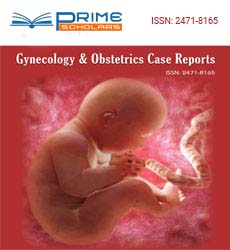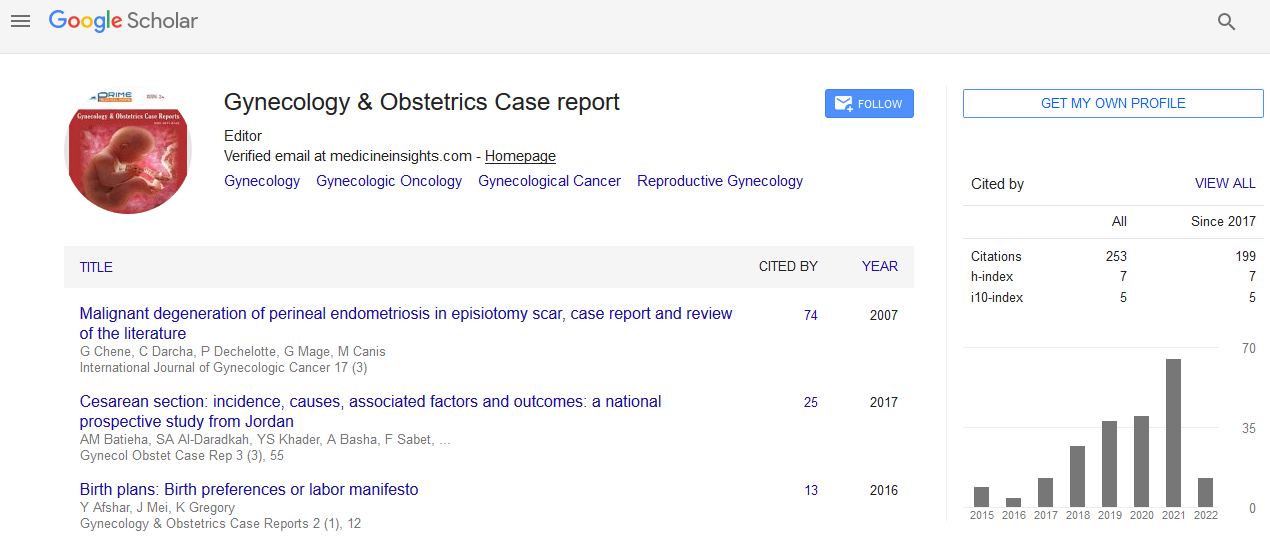Opinion - (2025) Volume 11, Issue 2
Efficacy of Immunomodulatory Therapies in Women with Unexplained Recurrent Pregnancy Loss
Abigail Madison*
Department of Gynecology Nursing, Florida International University, Miami, FL 33199, United States
*Correspondence:
Abigail Madison, Department of Gynecology Nursing, Florida International University, Miami, FL 33199,
United States,
Email:
Received: 24-Feb-2025
Editor assigned: 26-Feb-2025
Reviewed: 10-Mar-2025
Revised: 17-Mar-2025
Published:
24-Mar-2025
INTRODUCTION
Recurrent Pregnancy Loss (RPL), typically defined as the loss of two or more consecutive pregnancies before the 20th week of gestation, poses a significant clinical and emotional burden to affected women and couples. While many causes of RPL have been identified, including anatomical abnormalities, chromosomal anomalies, endocrine disorders and thrombophilias, a substantial subset of cases remains unexplained despite extensive evaluation. This category, known as Unexplained Recurrent Pregnancy Loss (uRPL), continues to challenge clinicians and researchers alike. One prevailing hypothesis in uRPL is that an underlying immunological dysfunction plays a critical role in early pregnancy failures. This theory has spurred interest in immunomodulatory therapies as potential interventions to improve pregnancy outcomes [1].
The maternal immune system must carefully balance immune tolerance of the semi-allogeneic fetus with continued immunosurveillance to protect against infections. Failure to achieve this immunological balance may lead to the rejection of the embryo or early pregnancy loss. Several immune components have been implicated in uRPL, including abnormal T-helper cell ratios, increased Natural Killer (NK) cell activity, dysregulated cytokine production and the presence of autoantibodies in the absence of a diagnosed autoimmune disease. Given this background, immunomodulatory therapies such as corticosteroids, Intravenous Immunoglobulin (IVIG), intralipid therapy and Tumor Necrosis Factor-Alpha (TNF-ÃÂ?±) inhibitors have emerged as potential treatments [2].
DESCRIPTION
Corticosteroids, particularly prednisone, have been used to suppress abnormal immune responses in women with RPL. By reducing inflammatory cytokines and modulating T-cell activity, corticosteroids may improve endometrial receptivity and embryo implantation. Some clinical studies have shown increased live birth rates in women with uRPL treated with corticosteroids, especially those with elevated NK cell levels or a history of autoimmune features. However, other trials have reported no significant benefit and concerns about adverse effects such as gestational diabetes and hypertension limit their routine use [3].
IVIG, a preparation of pooled immunoglobulin G from healthy donors, has been proposed to regulate immune responses through multiple mechanisms, including Fc receptor blockade, neutralization of autoantibodies and modulation of cytokine networks. Several uncontrolled studies and a few Randomized Controlled Trials (RCTs) have suggested that IVIG may improve live birth rates in women with uRPL, particularly in those with immunologic abnormalities. However, the heterogeneity in patient selection, dosing regimens and study designs has resulted in conflicting evidence and meta-analyses have not conclusively demonstrated a clear benefit. IVIG remains a costly and resource-intensive treatment with potential for adverse effects such as infusion reactions, which also affects its widespread adoption [4]. Another approach, intralipid therapy, involves the administration of a fat emulsion thought to downregulate cytotoxic NK cell activity and modulates Th1/Th2 cytokine balance. Although still investigational, some small-scale studies have reported improved pregnancy outcomes with intralipid therapy in women with elevated NK cell activity and uRPL. Yet, robust randomized evidence is lacking and the immunological basis of intralipid therapy remains poorly understood, warranting further investigation. TNF-ÃÂ?± inhibitors, such as adalimumab and etanercept, have gained attention for their role in suppressing proinflammatory cytokines implicated in implantation failure and pregnancy loss. A few observational studies and pilot trials have indicated that these agents may benefit women with uRPL and elevated TNF-ÃÂ?± levels or a high Th1/Th2 cytokine ratio. However, their use during pregnancy raises safety concerns and large-scale trials are needed to evaluate both efficacy and long-term fetal outcomes [5].
Other immunomodulatory agents, including low-dose aspirin, heparin and hydroxychloroquine, have also been explored, particularly when uRPL overlaps with thrombophilic or autoimmune profiles. Aspirin and heparin are commonly used in Antiphospholipid Antibody Syndrome (APS)-related RPL, but their role in strictly immunologic uRPL remains uncertain. Hydroxychloroquine, an antimalarial drug with immunomodulatory properties, has shown promise in small trials, particularly in women with underlying immune dysfunctions such as positive antinuclear antibodies. Despite the growing body of literature supporting the immunological basis of uRPL and the potential benefit of targeted immunomodulation, the current evidence base is marred by methodological limitations. Many studies suffer from small sample sizes, lack of standardized immune testing protocols, inconsistent definitions of uRPL and variable treatment regimens. As a result, there is no consensus on patient selection criteria or optimal immunomodulatory strategies. Furthermore, the heterogeneity of immune dysfunction in uRPL suggests that a one-size-fits-all approach is unlikely to be effective. Personalized medicine, involving comprehensive immune profiling and individualized therapy, may offer a more rational strategy in the future.
CONCLUSION
Immunomodulatory therapies represent a promising, albeit controversial, frontier in the management of unexplained recurrent pregnancy loss. While some women with identifiable immune abnormalities may benefit from treatments such as corticosteroids, IVIG, intralipids, or TNF-α inhibitors, robust, well-designed clinical trials are urgently needed to confirm their efficacy and safety. Until such evidence is available, these therapies should be considered experimental and used cautiously, preferably within the context of clinical research or specialized reproductive immunology centers. A deeper understanding of reproductive immunology and the development of precise diagnostic tools will be essential to transform the management of uRPL from empiricism to evidence-based care.
Acknowledgement
None.
Conflict of Interest
None.
REFERENCES
- Wankhade BS, Beniamein MMK, Alrais ZF, Mathew JI, Alrais GZ, et al. (2022) What should an intensivist know about pneumocephalus and tension pneumocephalus?. Acute Crit Care 38(2): 244.
Google Scholar Cross Ref Indexed at
- Sweni S, Senthilkumaran S, Balamurugan N, Thirumalaikolundusubramanian P (2013). Tension pneumocephalus: A case report with review of literature. Emerg Radiol 20: 573-578.
Google Scholar Cross Ref Indexed at
- Ahmad M, Bellamy S, Ott W, Mekhail R (2023). Pneumocephalus secondary to epidural analgesia: A case report. J Med Case Rep 17(1): 217.
Google Scholar Cross Ref Indexed at
- Wu X, Cao X, Zhang M, Wang Q, Han J, et al. (2023). Post-dural puncture headache combined with pneumocephalus secondary to vaginal delivery following epidural anesthesia: A case report. BMC Pregnancy Childbirth 23(1): 548.
Google Scholar Cross Ref Indexed at
- Hegazy Y, Balassiano NN, Gupta I, Stern R, Ghallab M (2024). Pneumocephalus after Lumbar Epidural Steroid Injection: A Rare Complication With Spontaneous Resolution. Cureus 16: e73268.
Google Scholar Cross Ref Indexed at
Citation: Citation: Madison A. (2025) Efficacy of Immunomodulatory Therapies in Women with Unexplained Recurrent Pregnancy
Loss. Gynecol Obstet Case Rep. Vol.11 No.2:15.
Copyright: Copyright: © Madison A. This is an open-access article distributed under the terms of the Creative Commons AttributionLicense,
which permits unrestricted use, distribution and reproduction in any medium, provided the original author and source are
credited.

